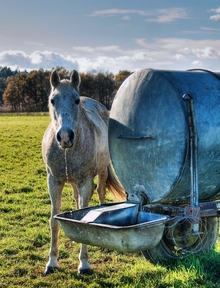The sunny, breezy days of summer bring many positive days of enjoyment for horse owners and their horses, but along with the enjoyment comes threats to horse health and well-being.

Sunny days of summer
Horses, too, sunburn, so make sure your horse has shade during the day or turn him out at night.
Keeping horses comfortable and healthy means planning ahead and taking precautions especially when it comes to sun, insects, diseases, and hoof care.
- Think about sun! Make sure your horse has shade during the day or turn him out at night. Shade trees are perfect, but if your fields are tree-free, consider a three-sided shed for shade and weather protection. Apply sun lotion to pale-skinned areas like white markings on the face. Horses can and do get sunburned. Appaloosas are especially prone to this, but any horse with a white blaze or even a snip with pink skin underneath may get burned. You can also use fly sheets that reflect the sun off and protect the coat. Some fly protection sprays also offer coat protection from the sun.
- Provide your horse with fly and insect protection. Flies can transmit disease and cause discomfort. A horse who stomps at flies all day may even come up lame. Some horses have allergic reactions to insect bites and need medical care. Sprays are the most commonly used type of fly repellent. Don't hesitate to try a variety of sprays or to switch brands occasionally. Natural recipes using essential oils may work as well. Flies do seem to develop a tolerance for various sprays after a period of time. If your horse will accept a good-fitting fly mask, that is a major help to keep flies away from their eyes. The masks with added ear covers are nice, too. Fly repellent sticks that roll-on around the eyes are also helpful. Fly sheets work well for horses that don't chew on each other or that go out alone. Switching your horse to pasture at night can help, but mosquitoes can be deadly and just as painful as flies. Spray the horse who goes out at night just like you would for daytime turn out.
- Think about fly and mosquito control for the environment as well as on your horse. Predator parasites added to the manure pile can cut down drastically on your local fly population by eating developing larvae. Be sure to pick out manure daily to reduce fly numbers in stalls and the barn. Encourage birds such as purple martins and barn swallows who eat many mosquitoes and flies every day. If you have ponds, think about stocking them with damselflies and dragonflies that consume mosquito larvae. Fat head minnows or other baitfish will also help to clean up mosquito larvae in your pond. Dump water buckets, tanks, and troughs daily if you have standing (not running) water to reduce the development of larvae.
- Speaking of water, your horse will need plenty of fresh, clean water daily. Dump your water sources every day if possible, not only to reduce insect larvae, but to be sure your horse's water is clean. Many horses will drink more water if they have a fresh, cool source. Don't forget to thoroughly scrub buckets, water troughs, and tanks at least once a week. The built-up scum makes the water unattractive to some horses.
- Hoof care is important all year-round of course, but some warm weather factors can really harm your horse's hooves. With dry weather and hard ground, many horses will need some extra TLC for their feet. Consider supplements in the feed if your horse's hooves are really brittle. Biotin (one of the B vitamins), calcium, zinc, and methionine, in addition to sulfur, are all common feed additives that may help maintain healthy hooves. Consider using a hoof dressing. Most hoof dressings are designed to hold moisture in. For this reason, you want to do a short, daily soak in water, followed by application of a good hoof dressing. That way more moisture will be retained. Keep up on trims so that minor cracks are trimmed away before they move up the hoof, especially if your horse tends to have brittle feet and/or goes unshod.
- Grooming is not to be skimped on in hot weather, either. In fact, your horse may need and appreciate grooming all the more in the summer. Dirt, dust, and sweat all contribute to a poor hair coat. Rain rot and scratches may get missed if you skip daily grooming. In addition, even a quick daily brushing gives you a chance to look your horse over for any cuts or sore areas. Hosing him down after a ride and then scraping your horse off will help keep his coat clean. You may need to plan on regular baths if your horse has an affinity for rolling in mud or dust.
- Don't forget to keep your tack clean, too. Leather needs some extra attention in hot, dry conditions and your horse will appreciate a clean girth and bridle. Use products to combat dryness and keep your leather supple. Staying on top of cleanliness includes saddle pads, saddle blankets, and any fleece rolls used on halters, bridles, or girths. Dirt and sweat can build up on those items and lead to skin irritations or even open sores. A horse who can handle a string girth when he has some winter fuzz may need a fleece cover for his girth in hot weather. Check the girth area after every ride for irritation.
- There are some important summertime health concerns as well. EEE, WEE, and WNV are all "summer diseases" usually showing up in August or September. A vaccine booster in July may be the ideal timing to keep these potentially fatal diseases at bay. Since these are mosquito-spread illnesses, following the mosquito control suggestions above will also help to keep your horse safe. Horses seem to find ways to injure themselves out on pasture in the summer, so be sure your tetanus coverage is also up-to-date. Inquisitive horses may snuffle wildlife, like rabid skunks, out in the fields, too, so rabies is another vaccine you want current. If possible, also do a quick check of your horse daily for scrapes or cuts from wild pasture play. Have a wound spray or ointment on hand for infection and to keep flies away.
Summer is a wonderful time to enjoy your horse, but be sure to stay on top of his care too.
Note: Article was originally posted in the EquiMed Health Center General Care section.



